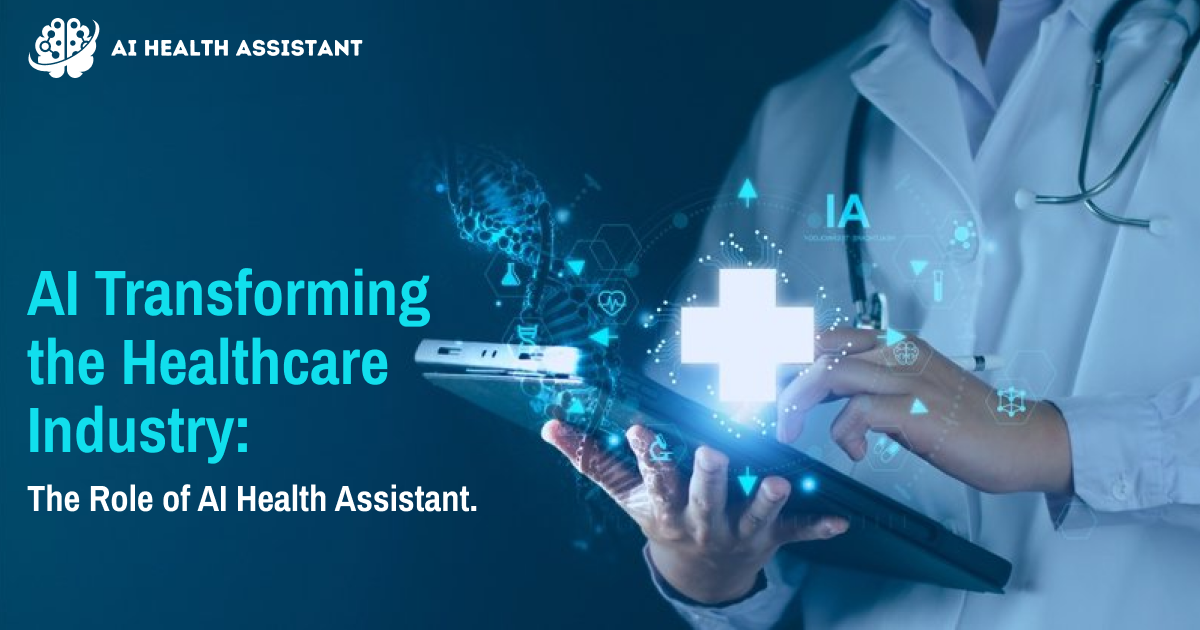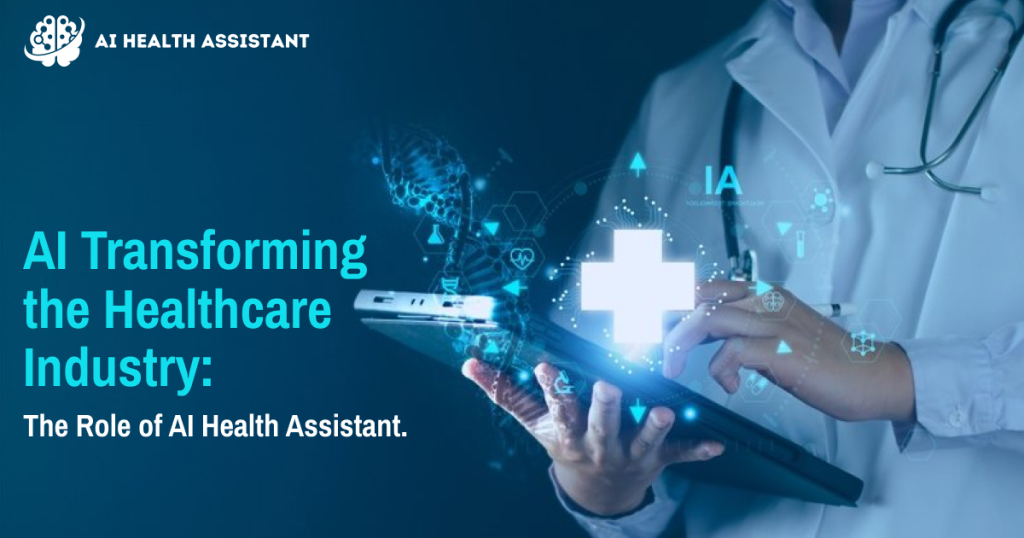
AI Transforming the Healthcare Industry: The Role of AI Health Assistant
Artificial Intelligence (AI) is revolutionizing the healthcare industry, ushering in a new era of innovation, efficiency, and improved patient outcomes. One of the significant contributions of AI in healthcare is the emergence of AIHealthAssistant. These intelligent virtual assistants leverage advanced algorithms and machine learning capabilities to enhance patient care, streamline administrative tasks, and support healthcare professionals in delivering more personalized and efficient services. In this article, we will explore how AI is transforming the healthcare industry through the lens of AI HealthAssistant.
Personalized Patient Care:
AIHealthAssistant play a crucial role in delivering personalized healthcare services. Through the analysis of patient data, including electronic health records (EHRs), medical histories, and real-time health monitoring, these assistants can provide tailored recommendations, treatment plans, and preventive care measures. Personalization not only improves patient satisfaction but also contributes to better health outcomes.
Enhanced Diagnostics and Imaging:
AI has demonstrated remarkable capabilities in medical diagnostics and imaging analysis. AIHealthAssistant can assist healthcare professionals in interpreting medical images, such as X-rays, MRIs, and CT scans, with high accuracy. This not only expedites the diagnostic process but also reduces the likelihood of human errors, leading to more reliable and timely diagnoses.
Efficient Data Management and Analysis:
The vast amount of healthcare data generated daily can be overwhelming for healthcare providers. AIHealthAssistant excel in managing and analyzing this data efficiently. They can sift through large datasets to identify patterns, trends, and correlations that may not be apparent to human practitioners. This data-driven approach contributes to evidence-based decision-making and more effective healthcare strategies.
Virtual Health Monitoring:
AIHealthAssistant enable remote patient monitoring, allowing healthcare providers to keep track of patients’ vital signs and health metrics in real-time. This is particularly beneficial for individuals with chronic conditions or those recovering from surgeries. Timely alerts and notifications can be generated based on deviations from normal health parameters, enabling proactive intervention and reducing the risk of complications.
Natural Language Processing for Patient Interaction:
The integration of natural language processing (NLP) in AIHealthAssistant facilitates seamless and natural communication between patients and the virtual assistant. Patients can ask questions, report symptoms, and receive information in a conversational manner. This enhances patient engagement, improves communication, and ensures that patients can easily access relevant health information.
Streamlined Administrative Tasks:
AIHealthAssistant excel at handling routine administrative tasks, freeing up healthcare professionals to focus on patient care. They can schedule appointments, manage billing inquiries, and handle documentation efficiently. This not only reduces administrative burdens but also contributes to cost savings and improved operational efficiency.
Drug Discovery and Development:
AI is accelerating the drug discovery process by analyzing vast datasets related to molecular structures, genomics, and clinical trial outcomes. Ai HealthAssistant contribute to identifying potential drug candidates, predicting their efficacy, and expediting the research and development phases. This has the potential to bring new and innovative treatments to market more quickly.
Predictive Analytics for Disease Prevention:
AIHealthAssistant leverage predictive analytics to identify individuals at risk of developing certain health conditions. By analyzing historical data and risk factors, these assistants can provide early warnings and preventive measures, enabling proactive interventions to mitigate the progression of diseases.
Ethical Considerations and Patient Privacy:
While the benefits of AIHealthAssistant are substantial, it is crucial to address ethical considerations, particularly concerning patient privacy and data security. Healthcare organizations must implement robust measures to safeguard sensitive patient information and adhere to regulatory frameworks to ensure ethical AI deployment.

Challenges and Future Considerations:
While AIHealthAssistant hold tremendous promise, challenges remain, including the need for standardized data formats, interoperability among healthcare systems, and addressing the “black box” nature of some AI algorithms. Continued research, collaboration between technologists and healthcare professionals, and ongoing advancements in AI technologies are essential to overcome these challenges.
Improving Access to Healthcare Services:
AIHealthAssistant contribute significantly to improving access to healthcare services, especially in regions with a shortage of healthcare professionals. By automating routine tasks and offering virtual consultations, these assistants extend the reach of healthcare, ensuring that more individuals can receive timely medical attention and advice.
Real-time Decision Support:
In critical healthcare situations, AIHealthAssistant provide real-time decision support to healthcare professionals. By analyzing patient data, they offer insights and suggestions that aid clinicians in making informed decisions, particularly in emergency scenarios where time is of the essence.
Continuous Learning and Adaptation:
AIHealthAssistant continually learn and adapt based on new information, research findings, and user interactions. This adaptability ensures that they stay current with the latest medical knowledge and treatment protocols, contributing to the delivery of state-of-the-art healthcare services.
Patient Empowerment:
Empowering patients with knowledge and self-care capabilities is a key aspect of AIHealthAssistant. By providing understandable health information, encouraging healthy behaviors, and fostering a sense of autonomy, these virtual assistants contribute to patients taking an active role in managing their well-being.
Regulatory Compliance and Standards:
Ensuring that AI Health Assistants adhere to regulatory standards and comply with healthcare protocols is essential. As the healthcare industry evolves, it becomes crucial to establish and uphold ethical guidelines to govern the development, deployment, and usage of AI in healthcare settings.
Looking Ahead:
As AIHealthAssistant continue to evolve, the future holds exciting possibilities for their integration into various facets of healthcare. From improving diagnostics to enhancing patient engagement, these virtual assistants are poised to play an increasingly integral role in shaping the future of healthcare delivery. Collaboration between technology developers, healthcare professionals, and regulatory bodies will be key to unlocking the full potential of AI in healthcare while addressing ethical considerations and ensuring patient-centric care.
In conclusion, the transformative impact of AIHealthAssistants on the healthcare industry is profound. From personalized patient care to streamlined administrative processes, the positive outcomes are diverse and promising. As these technologies advance, it is essential to foster a balanced approach that embraces innovation while prioritizing patient privacy, ethical considerations, and the overall well-being of individuals receiving healthcare services. The synergy between artificial intelligence and human expertise holds the promise of creating a healthcare landscape that is not only technologically advanced but also compassionate, accessible, and patient-centric.